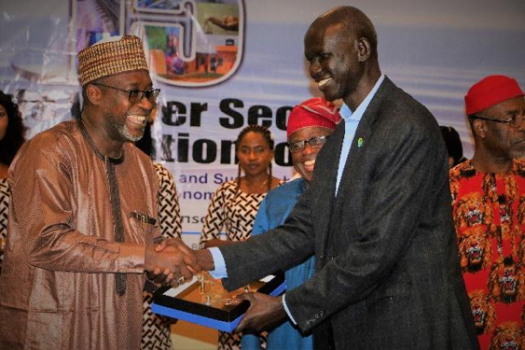Strategy to Help Achieve Access for All

According to the 2015 WHO/UNICEF Joint Monitoring Programme 435 million Africans lacked basic drinking water service, and 736 million Africans lacked basic sanitation service.
In November 2017, the African Ministers’ Council on Water (AMCOW) took a concrete step toward its role in realizing available and sustainable water and sanitation for all. At the 15th Anniversary Celebration and Executive Committee meetings of AMCOW, ministers from African countries, development partners, and sector stakeholders gathered to review and pass the 2018–2030 Strategic Plan for AMCOW.
“The significance of this anniversary is not only to celebrate our progress so far, but to also redefine our roles and responsibilities in ensuring water security and safe sanitation services.”
—Hon. Eng. Isack Kamwelwe, AMCOW President and Minister of Water and Irrigation, United Republic of Tanzania
In partnership with AMCOW, the U.S. Government’s Global Water Strategy aims to strengthen water sector governance, financing, and institutions to promote a path to self-reliance. USAID’s Water for Africa through Leadership and Institutional Support (WALIS) Program works with AMCOW to strengthen its role and impact because Africa is best served by African institutions. AMCOW is taking concrete steps with the support of the WALIS Program to increase member state ownership of AMCOW so that its leadership and technical capacity is leveraged to help achieve the African agenda on water and sanitation.
The WALIS Program’s support to AMCOW in strategic and financial planning aims to transform it into a more member state–oriented council. This transformation will be key to AMCOW’s financial sustainability and help meet the U.S. Government’s aim to transition it away from reliance on donor assistance. As a “Specialized Technical Subcommittee” of the African Union, AMCOW is in a critical position to lead the African agenda on water and sanitation. The council’s newly adopted 2018–2030 Strategic Plan lays out actionable steps to address continent-wide priorities related to water and sanitation. These include cross-cutting themes that have an impact on the sustainable management of water and sanitation for all such as climate change, sustainable infrastructure financing, monitoring and evaluation, and gender equality and youth.
AMCOW’s ability to convene all African Union member states places it in a unique position to amplify continent-wide solutions to strategically address regional water and sanitation challenges. The importance of AMCOW is underscored as the region works to achieve universal access for all and contribute to solving complex challenges such as the Lake Chad crisis. The Sustainable Development Goals mandate that by 2030 there should be availability and sustainable management of water and sanitation for all. To realize this goal, the world, and particularly Africa, has very real obstacles to overcome. Through WALIS support, USAID envisions a near future where member states regularly seek the political leadership, policy direction, and advocacy services of AMCOW to help Africa. Those services are readily supplied by a well-resourced AMCOW Secretariat with the acumen to help its member states better manage water and sanitation services for poverty alleviation, socio-economic development, regional cooperation, and the environment.
By Julia Eigner, Project Coordinator for WALIS
WALIS provides technical, programmatic, administrative, and logistical support to improve the capacity of African water, sanitation, and hygiene sector. Click here for more information.

